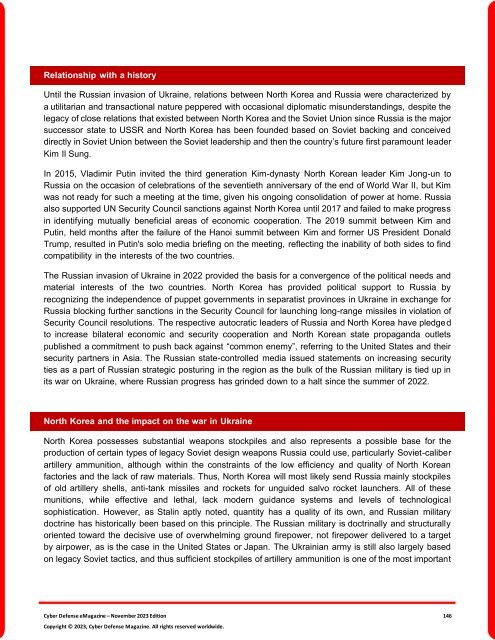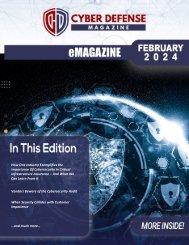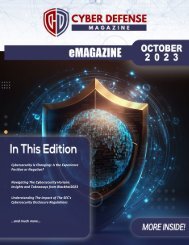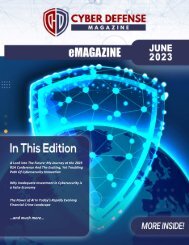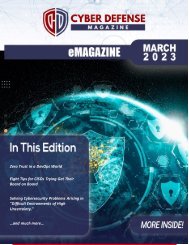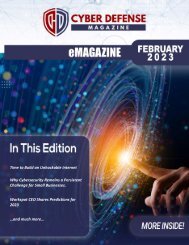The Cyber Defense eMagazine November Edition for 2023
Cyber Defense eMagazine November Edition for 2023 #CDM #CYBERDEFENSEMAG @CyberDefenseMag by @Miliefsky a world-renowned cyber security expert and the Publisher of Cyber Defense Magazine as part of the Cyber Defense Media Group as well as Yan Ross, Editor-in-Chief and many more writers, partners and supporters who make this an awesome publication! 196 page November Edition fully packed with some of our best content. Thank you all and to our readers! OSINT ROCKS! #CDM #CDMG #OSINT #CYBERSECURITY #INFOSEC #BEST #PRACTICES #TIPS #TECHNIQUES
Cyber Defense eMagazine November Edition for 2023 #CDM #CYBERDEFENSEMAG @CyberDefenseMag by @Miliefsky a world-renowned cyber security expert and the Publisher of Cyber Defense Magazine as part of the Cyber Defense Media Group as well as Yan Ross, Editor-in-Chief and many more writers, partners and supporters who make this an awesome publication! 196 page November Edition fully packed with some of our best content. Thank you all and to our readers! OSINT ROCKS! #CDM #CDMG #OSINT #CYBERSECURITY #INFOSEC #BEST #PRACTICES #TIPS #TECHNIQUES
You also want an ePaper? Increase the reach of your titles
YUMPU automatically turns print PDFs into web optimized ePapers that Google loves.
Relationship with a history<br />
Until the Russian invasion of Ukraine, relations between North Korea and Russia were characterized by<br />
a utilitarian and transactional nature peppered with occasional diplomatic misunderstandings, despite the<br />
legacy of close relations that existed between North Korea and the Soviet Union since Russia is the major<br />
successor state to USSR and North Korea has been founded based on Soviet backing and conceived<br />
directly in Soviet Union between the Soviet leadership and then the country’s future first paramount leader<br />
Kim Il Sung.<br />
In 2015, Vladimir Putin invited the third generation Kim-dynasty North Korean leader Kim Jong-un to<br />
Russia on the occasion of celebrations of the seventieth anniversary of the end of World War II, but Kim<br />
was not ready <strong>for</strong> such a meeting at the time, given his ongoing consolidation of power at home. Russia<br />
also supported UN Security Council sanctions against North Korea until 2017 and failed to make progress<br />
in identifying mutually beneficial areas of economic cooperation. <strong>The</strong> 2019 summit between Kim and<br />
Putin, held months after the failure of the Hanoi summit between Kim and <strong>for</strong>mer US President Donald<br />
Trump, resulted in Putin's solo media briefing on the meeting, reflecting the inability of both sides to find<br />
compatibility in the interests of the two countries.<br />
<strong>The</strong> Russian invasion of Ukraine in 2022 provided the basis <strong>for</strong> a convergence of the political needs and<br />
material interests of the two countries. North Korea has provided political support to Russia by<br />
recognizing the independence of puppet governments in separatist provinces in Ukraine in exchange <strong>for</strong><br />
Russia blocking further sanctions in the Security Council <strong>for</strong> launching long-range missiles in violation of<br />
Security Council resolutions. <strong>The</strong> respective autocratic leaders of Russia and North Korea have pledged<br />
to increase bilateral economic and security cooperation and North Korean state propaganda outlets<br />
published a commitment to push back against “common enemy”, referring to the United States and their<br />
security partners in Asia. <strong>The</strong> Russian state-controlled media issued statements on increasing security<br />
ties as a part of Russian strategic posturing in the region as the bulk of the Russian military is tied up in<br />
its war on Ukraine, where Russian progress has grinded down to a halt since the summer of 2022.<br />
North Korea and the impact on the war in Ukraine<br />
North Korea possesses substantial weapons stockpiles and also represents a possible base <strong>for</strong> the<br />
production of certain types of legacy Soviet design weapons Russia could use, particularly Soviet-caliber<br />
artillery ammunition, although within the constraints of the low efficiency and quality of North Korean<br />
factories and the lack of raw materials. Thus, North Korea will most likely send Russia mainly stockpiles<br />
of old artillery shells, anti-tank missiles and rockets <strong>for</strong> unguided salvo rocket launchers. All of these<br />
munitions, while effective and lethal, lack modern guidance systems and levels of technological<br />
sophistication. However, as Stalin aptly noted, quantity has a quality of its own, and Russian military<br />
doctrine has historically been based on this principle. <strong>The</strong> Russian military is doctrinally and structurally<br />
oriented toward the decisive use of overwhelming ground firepower, not firepower delivered to a target<br />
by airpower, as is the case in the United States or Japan. <strong>The</strong> Ukrainian army is still also largely based<br />
on legacy Soviet tactics, and thus sufficient stockpiles of artillery ammunition is one of the most important<br />
<strong>Cyber</strong> <strong>Defense</strong> <strong>eMagazine</strong> – <strong>November</strong> <strong>2023</strong> <strong>Edition</strong> 146<br />
Copyright © <strong>2023</strong>, <strong>Cyber</strong> <strong>Defense</strong> Magazine. All rights reserved worldwide.


